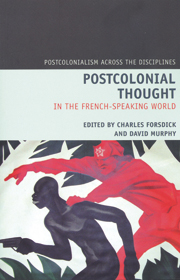Book contents
- Frontmatter
- Contents
- Acknowledgements
- Introduction: Situating Francophone Postcolonial Thought
- Section 1 Twelve Key Thinkers
- Section 2 Themes, Approaches, Theories
- 13 Postcolonial Anthropology in the French-speaking World
- 14 French Theory and the Exotic
- 15 The End of the Ancien Régime French Empire
- 16 The End of the Republican Empire (1918–62)
- 17 Postcolonialism and Deconstruction: The Francophone Connection
- 18 Negritude, Présence Africaine, Race
- 19 Francophone Island Cultures: Comparing Discourses of Identity in ‘Is-land’ Literatures
- 20 Locating Quebec on the Postcolonial Map
- 21 Diversity and Difference in Postcolonial France
- 22 Colonialism, Postcolonialism and the Cultures of Commemoration
- 23 Gender and Empire in the World of Film
- 24 From Colonial to Postcolonial: Reflections on the Colonial Debate in France
- Notes on Contributors
- Bibliography
- Index
23 - Gender and Empire in the World of Film
from Section 2 - Themes, Approaches, Theories
- Frontmatter
- Contents
- Acknowledgements
- Introduction: Situating Francophone Postcolonial Thought
- Section 1 Twelve Key Thinkers
- Section 2 Themes, Approaches, Theories
- 13 Postcolonial Anthropology in the French-speaking World
- 14 French Theory and the Exotic
- 15 The End of the Ancien Régime French Empire
- 16 The End of the Republican Empire (1918–62)
- 17 Postcolonialism and Deconstruction: The Francophone Connection
- 18 Negritude, Présence Africaine, Race
- 19 Francophone Island Cultures: Comparing Discourses of Identity in ‘Is-land’ Literatures
- 20 Locating Quebec on the Postcolonial Map
- 21 Diversity and Difference in Postcolonial France
- 22 Colonialism, Postcolonialism and the Cultures of Commemoration
- 23 Gender and Empire in the World of Film
- 24 From Colonial to Postcolonial: Reflections on the Colonial Debate in France
- Notes on Contributors
- Bibliography
- Index
Summary
France in film
Insofar as film scholarship followed literary studies, in the 1980s and 1990s, in taking up Benedict Anderson's work on the construction of national identity through imagined communities, much attention has been devoted to looking at French films that participate in that process by construing colonized peoples as primitive and frequently feminized ‘Others’, in opposition to whom the French define themselves as rational, enlightened and civilized. Like the films themselves, the analyses vary in the degree to which they see colonizer/colonized relations in terms of stark binaries or in terms of ambiguous hybrid identities on both sides. Yet whatever the emphasis, it is French national identity that takes centre stage. The chapter will consider the ways in which gender and empire figure in films concerned mainly with Africa and other formerly colonized spaces. The initial intention, however, is to assess some of the more interesting film scholarship on questions of gender, empire and French national identity, especially with respect to colonial films of the interwar period, as well as postcolonial films looking back at the French empire, usually in a nostalgic way.
Ginette Vincendeau's Pépé le Moko (1998) is the most sustained analysis of a single classic film and the historical context of its production and reception. Like many studies of the past two decades, it highlights cinematic masculinity as a problem that warrants as much scrutiny as its feminine counterpart.
- Type
- Chapter
- Information
- Postcolonial Thought in the French Speaking World , pp. 285 - 294Publisher: Liverpool University PressPrint publication year: 2009



